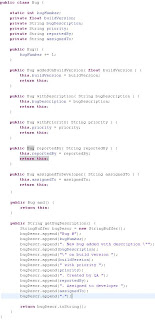Difference between using "" and toString() method for converting object value to String:
Case I - Using "":
-----------------------------------------------------------------
BigDecimal dec = new BigDecimal("1234567");
String str = "" + dec; // converting dec to String
System.out.println("str: "+str);
o/p:
str: 1234567
-----------------------------------------------------------------
-----------------------------------------------------------------
BigDecimal dec = null;
String str = "" + dec; // converting dec to String
System.out.println("str: "+str);
o/p:
str: null
-----------------------------------------------------------------
Case II - Using toString() method:
-----------------------------------------------------------------
BigDecimal dec = new BigDecimal("1234567");
String str = null;
if( dec!=null ) {
str = dec.toString(); // converting dec to String
}
System.out.println("str: "+str);
o/p:
str: 1234567
-----------------------------------------------------------------
-----------------------------------------------------------------
BigDecimal dec = null;
String str = null;
if( dec!=null ) {
str = dec.toString(); // converting dec to String
}
System.out.println("str: "+str);
o/p:
str: null
-----------------------------------------------------------------
In first case, we don't require
null check, but doesn't has readability.
In second case, we require
null check, but has readability.
Each one has its own ease of use.










